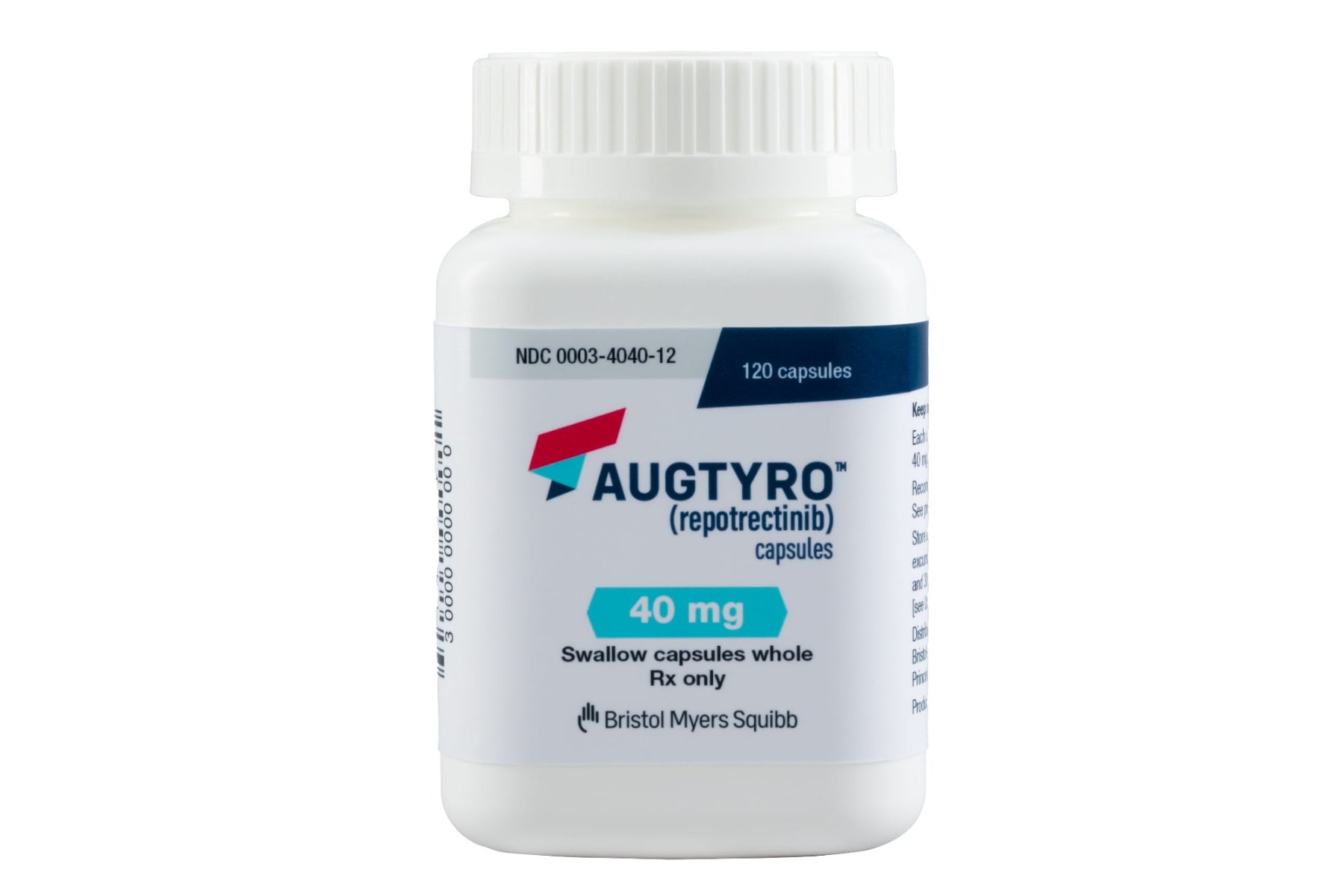Keytruda (pembrolizumab) vs Augtyro (repotrectinib)
Keytruda (pembrolizumab) vs Augtyro (repotrectinib)
Keytruda (pembrolizumab) is an immunotherapy drug that works by blocking the PD-1 pathway, thereby boosting the immune system's ability to fight certain types of cancer, such as melanoma, non-small cell lung cancer, and head and neck cancer. On the other hand, Augtyro (repotrectinib) is a targeted therapy designed to inhibit the activity of proteins called TRK, ROS1, and ALK, which are involved in the growth of certain tumors, particularly in non-small cell lung cancer and solid tumors with specific genetic alterations. When deciding between Keytruda and Augtyro, it is crucial to consider the specific type and genetic makeup of the cancer, as well as the patient's overall health, as these factors will determine which medication is more appropriate for their treatment.
Difference between Keytruda and Augtyro
| Metric | Keytruda (pembrolizumab) | Augtyro (repotrectinib) |
|---|---|---|
| Generic name | Pembrolizumab | Repotrectinib |
| Indications | Various types of cancers including melanoma, lung cancer, head and neck cancer, Hodgkin lymphoma, and others | Advanced solid tumors with NTRK gene fusions, ROS1-positive non-small cell lung cancer (NSCLC) |
| Mechanism of action | Programmed death receptor-1 (PD-1) blocking antibody | Tyrosine kinase inhibitor targeting TRK, ROS1, and ALK |
| Brand names | Keytruda | Augtyro |
| Administrative route | Intravenous infusion | Oral |
| Side effects | Fatigue, musculoskeletal pain, decreased appetite, pruritus, diarrhea, nausea, rash, fever, cough, dyspnea, constipation, pain in extremity, and headache | Dizziness, dysgeusia, fatigue, constipation, edema, myalgia, cognitive effects, and weight increased |
| Contraindications | Individuals with hypersensitivity to pembrolizumab or any of its excipients | Individuals with hypersensitivity to repotrectinib or any of its excipients |
| Drug class | Anti-PD-1 monoclonal antibody | Tyrosine kinase inhibitor |
| Manufacturer | Merck & Co. | Turning Point Therapeutics, Inc. |
Efficacy
Efficacy of Keytruda (Pembrolizumab) in Lung Cancer
Keytruda (pembrolizumab) is a highly effective immunotherapy drug used in the treatment of certain types of lung cancer. It is a programmed death receptor-1 (PD-1) blocking antibody that works by enhancing the body's immune system to help detect and fight cancer cells. Pembrolizumab has shown significant efficacy in treating non-small cell lung cancer (NSCLC), particularly in patients whose tumors express PD-L1 and who have not had prior chemotherapy for metastatic disease. Clinical trials have demonstrated that Keytruda can improve overall survival and progression-free survival compared to traditional chemotherapy regimens.
In the treatment of NSCLC, Keytruda is often administered as a first-line treatment or in combination with other therapies. Its efficacy has been observed in various settings, including as a monotherapy in patients with high PD-L1 expression and in combination with chemotherapy irrespective of PD-L1 expression levels. The response rates and the duration of response have been found to be superior in Keytruda-treated patients compared to those receiving only chemotherapy. Additionally, Keytruda has been approved for use in certain patients with extensive-stage small cell lung cancer (SCLC) following studies showing a benefit in survival.
Efficacy of Augtyro (Repotrectinib) in Lung Cancer
As of the knowledge cutoff date in early 2023, Augtyro (repotrectinib) is an investigational, next-generation tyrosine kinase inhibitor (TKI) targeting the tropomyosin receptor kinase (TRK), ROS1, and anaplastic lymphoma kinase (ALK) fusions. It is being studied for its efficacy in treating lung cancers that harbor these specific genetic alterations. Repotrectinib has shown promise in early clinical trials, demonstrating potent activity against ROS1-positive NSCLC, including in patients who have developed resistance to prior ROS1 inhibitors.
While comprehensive data on the efficacy of Augtyro in lung cancer is still being gathered, preliminary results from clinical trials suggest that repotrectinib may offer an effective treatment option for patients with advanced NSCLC harboring ROS1 or NTRK fusions, particularly those who have relapsed or are refractory to existing therapies. The drug has been designed to overcome resistance mechanisms that limit the effectiveness of first-generation TKIs, and ongoing studies are evaluating its safety profile and long-term outcomes in lung cancer patients. As repotrectinib is still under investigation, it is important to monitor the results of ongoing clinical trials to fully understand its potential role in lung cancer therapy.
Regulatory Agency Approvals
Keytruda
-
European Medical Agency (EMA), European Union

-
Food and Drug Administration (FDA), USA

-
Health Canada

-
Therapeutic Goods Administration (TGA), Australia

-
Medsafe (NZ)

Augtyro
-
Food and Drug Administration (FDA), USA

Access Keytruda or Augtyro today
If Keytruda or Augtyro are not approved or available in your country (e.g. due to supply issues), you can access them via Everyone.org.
How it works

Make an enquiry
Choose the medicine you want to buy, answer a couple of questions, and upload your prescription to speed things up. We’ll get back to you within 24 hours.


Make an enquiry
Choose the medicine you want to buy, answer a couple of questions, and upload your prescription to speed things up. We’ll get back to you within 24 hours.


Breeze through the paperwork
We'll guide you through the required documents for importing unapproved medicine, ensuring you have all the necessary information.


Get a personalized quote
We’ll prepare a quote for you, including medicine costs and any shipping, administrative, or import fees that may apply.


Receive your medicine
Accept the quote and we’ll handle the rest - sourcing and safely delivering your medicine.

Some text on this page has been automatically generated. Speak to your physician before you start a new treatment or medication.
Let's talk
If you have any questions, call us or send us a message through WhatsApp or email:
Contact us




